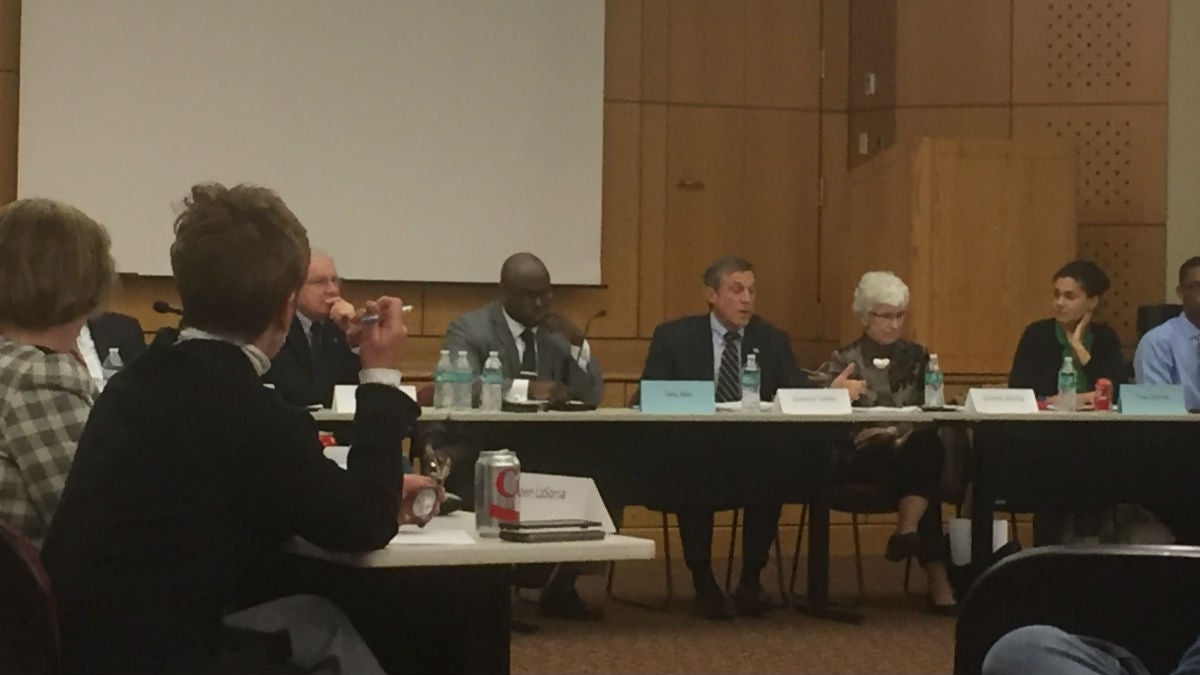Gov. Carney orders new anti-bias guidelines to protect Del. students

Gov. Carney (speaking, center) has directed education secretary Susan Bunting (seated next to him) to draft anti-bias guidelines to protect Delaware's 137,000 public school students. (Zoey Read/WHYY)
Gov. Carney has ordered the creation of new state guidelines to prohibit discrimination against students based on characteristics such as gender, race, ethnicity, sexual orientation and gender identity or expression.
The governor wants Delaware’s 19 school districts and charter schools to use the “model policy” developed by the Department of Education to inform their own policies “to suit the needs of their students,” Carney’s office said in a news release.
Carney’s move to protect Delaware’s 137,000 public school students from bias follows his administration’s modification in April of anti-discrimination policies in state government. Carney took office in January, a year after a group of religious and civil rights leaders released a report alleging racism, discrimination and retaliation in state government, especially at the Department of Labor in Kent and Sussex counties.
“I expect Delaware’s school districts to ensure that every student can attend school comfortably and without fear of discrimination – now and in the future,” Carney, a Democrat, said in a written statement. “At the state level, we’re making sure that state agencies follow a consistent anti-discrimination policy. This will help our schools move in that same direction.”
Secretary of Education Susan Bunting’s office will use input from the public and school leaders to develop the policy, which Carney wants published for public comment by Nov. 1.
In a memo Monday to Bunting, Carney reiterated his commitment to an inclusive atmosphere in state offices and schools. The state spends about $1.2 billion annually – about one-third of the general fund budget, on Delaware’s public schools. That money pays about 60 percent of the cost of K-12 education in Delaware.
“It is critical that all schools in Delaware be welcoming, inclusive places where students and staff members alike can flourish,” Carney wrote. “Our schools should be places where students are comfortable, embraced, and challenged to achieve great heights. Any practices that prevent this, whether purposeful or by accident, hinder our state’s progress.”
Matt Burrows, superintendent of the Appoquinimink School District and past president of the Delaware Chief School Officers Association, said he supports Carney’s move.
“Like the governor, we agree that there’s no room in our schools for discrimination of any kind. We applaud his directive … and look forward to positive outcomes like state-approved training, compliance standards, funding, and communication” from Bunting’s department.
Burrows, who has been in education for more than 15 years, added: “There have always been transgender students in our schools. But we’ve seen how, in other states, creating protection against discrimination can become a controversial issue. So I’m grateful to the Department of Education for taking the lead to ensure that we’re looking at our processes and making changes where needed.”
Merv Daughtery, president of the Red Clay Consolidated School District, which has about 16,000 students — most in the state — said his district has anti-discrimination policies, but “if the governor and DOE want to clarify the policies that would be helpful.”
Heath Chasanov, Woodbridge district superintendent and new head of the school chiefs group, said he supports the state’s efforts “to ensure that all of our students are attending schools that are safe and supportive. We commend Governor Carney for addressing this issue at a statewide level so that schools can have consistent guidance in an area that has lacked the appropriate supports for schools in the past.”
WHYY is your source for fact-based, in-depth journalism and information. As a nonprofit organization, we rely on financial support from readers like you. Please give today.




